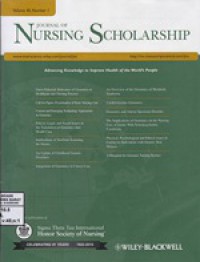
Jurnal
Cultural Correlates of Burden in Primary Caregivers of Older Relatives: A Cross-sectional Study
Purpose: To analyze the effect of cultural factors on the subjective burden of primary home caregivers of older relatives.
Design: Cross-sectional study. Primary home caregivers (N = 208) of older relatives were recruited in Spain using systematic random sampling.
Methods: The data were collected in 2010 through interviews. The measures included sociodemographic characteristics, stressors (the intensity of care provided and the care-recipient’s needs; the latter were assessed using the Barthel Index, the Pfeiffer Short Portable Mental Status Questionnaire and the Cummings Neuropsychiatric Inventory), cultural factors (kinship ties, common residence, perceived social support, and cultural motives for caregiving), and caregiver subjective burden (Caregiver Strain Index). The data were analyzed using bivariate procedures and multiple linear regression.
Findings: After controlling for caregiver age, caregiver gender, stressors, and duration of caregiving, subjective burden was negatively associated with perceived social support and reciprocity, and in the subgroup of adult children, it was positively associated with common residence. Cultural factors explained 29% of the variance in burden.
Conclusions: Our findings add to the existing evidence regarding the influence of cultural factors in the perception of burden in caregiving situations. Clinical Relevance: A risk profile could be proposed for subjective burden in primary family caregivers. Individuals who are at risk are characterized as young, offspring who live with the care recipient, care for a care recipient with
behavioral problems, are unsatisfied with the social support received, and have a low balanced reciprocity.
Availability
No copy data
Detail Information
- Series Title
-
Journal of Nursing Scholarship, Volume 46, Number 3 2014
- Call Number
-
(05) 610.5 WIL j
- Publisher
- Malden : Wiley-Blackwell., 2014
- Collation
-
Hlm. 176-186
- Language
-
English
- ISBN/ISSN
-
1527-6546
- Classification
-
(05) 610.5 WIL j
- Content Type
-
-
- Media Type
-
-
- Carrier Type
-
-
- Edition
-
Volume 46, Number 3
- Subject(s)
- Specific Detail Info
-
-
- Statement of Responsibility
-
-
Other version/related
No other version available
File Attachment
Comments
You must be logged in to post a comment
 Computer Science, Information & General Works
Computer Science, Information & General Works  Philosophy & Psychology
Philosophy & Psychology  Religion
Religion  Social Sciences
Social Sciences  Language
Language  Pure Science
Pure Science  Applied Sciences
Applied Sciences  Art & Recreation
Art & Recreation  Literature
Literature  History & Geography
History & Geography